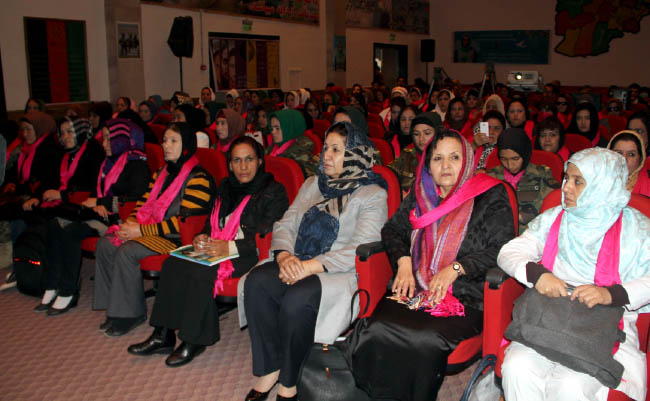The 8th of March was celebrated as International Women’s Day across the world, but does it matter for Afghan women? The rights of women have been a controversial issue and Afghan women left several regimes behind, including the Taliban’s regime. The political ups and downs throughout the history involved women’s rights and liberty and the patriarchal system left them at the mercy of injustice. They suffered indescribable pains and anguish. Their rights have been violated and their freedoms were curtailed in one way or another.
Moreover, Afghan women have been the victim of traditional cultures. Their rights were restricted within the closed frame of traditions being practiced mainly in tribal belts. In other words, the parochial mindsets regarding women played highly negative role across the country through engendering hatred and misogyny. Women’s role was tailored to men’s desires. They were deemed inferior creature and had to be all ears to their spouses’ orders. After all, stereotypes abounded in our literature and our culture concerning women and continue up to now.
The Taliban’s regime treated women as a pariah and trampled upon their rights and liberty. It is believed that Afghan women bore the brunt of violence during that regime. Women were not allowed to attend schools or go to bazaar without chaperone. They were flagellated in public places in case of eloping with their favorite men. Their social and political role was denied.
With the establishment of democracy in the post-Taliban Afghanistan, Afghan women were entitled to engage in social, cultural and political activities, including being candidate for presidency and provincial council. Constitutionally, “the citizens of Afghanistan, man and woman, have equal rights and duties before the law.” In the meantime, “liberty and human dignity are inviolable. The state shall respect and protect liberty as well as human dignity.” The current Constitution of Afghanistan, which was approved in 2004, is the most unprecedented one of its kind in the country’s history.
It is believed that there are three attitudes towards women in Afghanistan: (1) the radical and Talibanic attitude holds strong sway in tribal areas. In remote and Taliban dominated areas, the public treat women with disdain and consider no human rights for them. They are still deemed an inferior creature and restricted within harsh cultural boundaries. The air is filled with a misogynistic view and the tribal council decides whether or not one is criminal and deserves punishment. Women are tortured in desert court for crossing the cultural red line which is against the Constitution and religious tenets. Simultaneously, the residents of tribal regions feel pessimistically regarding the government and its law. As a result, taking a family issue to the court will be a great disdain for them. They believe that entitling women to equal freedoms and rights with men will lead to moral turpitude and women, according to them, deserve no more than working within the four walls. (2) There are some moderate opinions regarding women’s rights and liberty too, which agree with the country’s Constitution. Based on this idea, women should be treated with respect and given equal rights and freedoms with men. The government must empower women and pave the way for their social and political activities. This moderate attitude, which is also supported by women, is in accordance with religious tenets. (3) There are also secular ideas about women which consider boundless rights and liberty for them. The supporters of this idea, who are mostly the so-called intellectuals, suggest that women should be liberated from all religious values and cultural norms. Such an approach will result in violation of women’s human rights and dignity. To consider the religious and historical background of the country, this attitude is against the public beliefs and may trigger a harsh reaction, mainly from the residents of tribal belts and religious figures. This will further put our moral values and cultural standards at stake with the process of time.
In real life, however, Afghan women suffer domestic violence and social discriminations. Worst of all, the militant fighters, including the Taliban guerillas, spill the blood of women without a tinge of guilt and pay no heed to their natural rights and dignity. In another item, the unmitigated militancy poses a serious threat to women’s life and liberty and discourages them from playing active role in political arena. It is feared that the emergence of the self-styled Islamic State of Iraq and the Levant (ISIL) group, which practices upon more radical ideology, will further imperil women’s life and liberty. The democratic discourses and national and international conferences failed to put an end to the sufferings of Afghan women. Their voice still falls on deaf ears and their rights are violated with impunity. Afghan women are not only the victim of terrorism but also of social injustice and cultural restrictions which stem from radical mentalities and parochial mindsets.
To lessen the anguish of Afghan women, the religious figures and clergy will have to enlighten women’s fundamental rights according to the true spirit of religious tenets so that they can root out wrong traditions deeply implanted in our culture. Meanwhile, the government must protect women’s rights through enforcing the law and campaigning against the radical mindsets. The violators of women’s rights and liberty should be prosecuted on the basis of law. Prayerfully, Afghan women will breathe a sigh of relief and enjoy the fruition of true democracy in near future.

